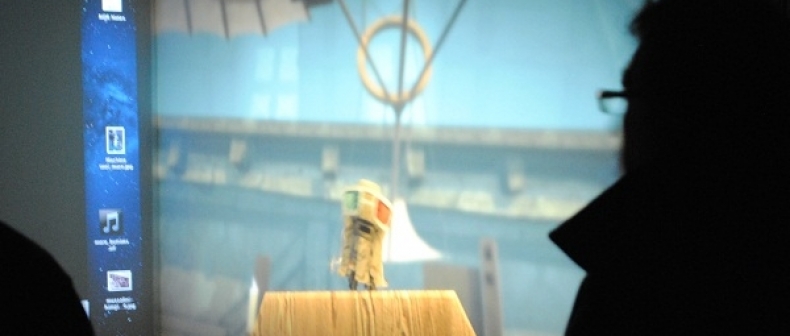
As a relatively young medium, the question ‘Are games art?’ has plagued the video game community in recent years, especially as games move away from being the glossy, AAA, gory combat experiences we’re used to and become something softer, gentler, and more meaningful (think games like Papo & Yo, Ico, and multi award winner Journey). For most of us who have grown up with games and fallen in love with many a game world, this isn’t even a question.
I remember, as a 12-year-old, watching my older stepbrother play Final Fantasy 7, and becoming absolutely captivated by the dirty, troubled city of Midgar, and a world where using magic was as easy as picking up a stone (but that that kind of power, of course, was not without its cost). It didn’t take long before I picked up the controller myself. This was far from the first game I had ever played, and it certainly hasn’t been the last. For me, whether or not games are art was never really a question, because I knew from an early age that a game had the potential to immerse you in a world or a story in a way that books, television, or movies could not. They allow the player a level of control and a sense of ownership and kinship with a story and its characters that no other medium can– if that’s not art, I don’t know what is. (Not to mention all the beautiful concept art that goes into making a game).
For the creators of the Vector Game and Art Festival, whether games are art isn’t a question either. I had the pleasure of attending a couple of weeks ago, and it was really like no other game event I had ever been to. This was a truly artistic cultural event and not a commercial one, the only difference being that most of the exhibits had a controller attached. The festival featured panels on issues like women in games and the game industry, the politics of appropriation in games, as well as exploring the artistic implications of the medium. There were short films, traditional visual art pieces, and even performance art all centered on the theme of games and gaming, including board games and pen-and-paper games.
The performance art was really the highlight of Vector; Playing Personae: Engendered + Embodied Performances explored the issue of the representation of gender by having the audience use a human controller while playing Dead or Alive, the game that started the breast physics “revolution.” The controls just so happened to be placed on the wearer’s chest (and one of them was a woman). There was also a performance of Halo Ballet, a choreographed dance performance performed live in Halo to a live musical score. My explanation really doesn’t do it justice– you have to see it to believe it.
I caught up with the Vector crew (Scot Deeming, Clint Enns, Kate Micak, and Christine Kim) after the festival to ask them some questions about all things Vector.
What is your background? Are you all from the game industry or are you from a different discipline(s)?
All four members of Team Vector have a number of backgrounds, all related to artistic practice. Skot is a VJ/ new media artist/games/game art curator, Clint is a film maker/screening programmer/new media artist, Katie is a video artist and curator, and Christine is a DIY game maker/curator/new media art historian.
None of us came from the game industry, we come from artistic practices, curatorial practices, and the study of new media art.
Why did you start Vector?
With so many conversations about “games as an art form” proliferating in popular media, we felt that it was time to add another facet to the conversation. One centered around games as the tools and inspiration for making contemporary artworks. Works that are games are included in this, but so are works that were made from games, or their technologies. This way we could address a wide range of artworks that fall outside of the categorical distinctions of ‘games’ as well.
Is this the first year Vector has been held?
It is, while some of us have curated game art shows in the past, this is the first year for the festival.
Games are, for the most part, seen as diversionary and unimportant, and mostly aren’t recognized as cultural artifacts like books or even film. Why do you think it’s so important that people start seeing games as the important cultural medium that they are?
Every medium goes through these growing pains. For many years, people dismissed cinema’s merits as an art form, as well as photography, jazz, and many others. If we think of it this way, this is just part of the process of watching a medium grow. For Team Vector, it’s important for us to help that along by showing people that games as a medium have grown well beyond simple entertainment. It’s an expressive medium just like any other, capable of deep meaningful experiences, just like any other medium.
How did you find all the artists for the show?
Our strategy was twofold. While the members of Team Vector had works by artists that they wanted to curate into the exhibitions and performances, including a curatorial collaboration with a curator from the UK, we filled in what we felt to be gaps in our programming by having an open call for artworks. It was through the combination of curated works and works from the open call that we put together our entire programme for the festival.
Do you think Toronto’s healthy indie game scene helps make a festival like Vector possible?
It’s definitely a part of it. The indie scene has been very supportive of this project from the beginning, when we began working on Vector last summer. And a large number of local independent developers and organizers participated in vector as artists, panelists and workshop leaders. Without them, we wouldn’t have been able to provide the scope of the programming we were able to.
What do you hope to be able to bring to Vector in the future?
Well, we certainly have a wish list of artists and performers that we’d like to bring in for future programming. And we will be working towards that for a 2014 incarnation of the festival. But for now, we’re collecting ourselves, and will be spending a great deal of time working on the Vector Annual, which is a journal/ festival catalogue that we plan on launching in the fall of 2013.
To find out more about Vector, and to keep tabs on details about the 2014 edition of the festival, head straight to the official Vector website and blog.
____
Megan Patterson is the Science and Technology Editor at Paper Droids and currently a Toronto Standard intern. She also tweets more than is healthy or wise.
For more, follow us on Twitter at @torontostandard and subscribe to our Newsletter.














